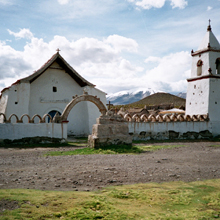Carnaval Isluga
Música de la celebración de carnaval en el pueblo aymara de Isluga, altiplano de la I región, Chile.
El Museo se encuentra ubicado en pleno centro de Santiago, en la esquina de las calles Bandera y Compañía, a una cuadra de la Plaza de Armas.
Chileans and resident foreigners: $1,000 Foreigners: $8,000 Chilean students and resident foreigners: $500 Foreign students: $4,000
El Museo cuenta con un servicio de guías, sin costo adicional, para los establecimientos educacionales.
Invitamos especialmente a coordinarse con alguno de nuestros guías para programar una visita o actividades de motivación y seguimiento que aprovechen de la mejor forma la experiencia de visitarnos.
Download recordings of the Permanent Exhibition display texts in English, French, Portuguese and Spanish here. These audioguides are in mp3 format and are arranged by cultural area, following the same order as our exhibit galleries. Descargue desde esta página audioguías en castellano, inglés, francés y portugués con los textos de las vitrinas de la […]
This site focuses on the art of the peoples of the Americas, grouped according to Cultural Areas.
The exhibition ranges from the oldest groups of fishermen to the current native peoples.
These smaller sites are dedicated to the temporary exhibits that the Museum has mounted each year.
Exhibitions performed and produced by the Chilean Museum of Pre-Columbian Art.
This site explores the exhibitions prepared by the Museum and sent on tour across Chile and around the globe.
Mesoamerica is the area that covers the present-day countries of Mexico, Guatemala, Honduras, El Salvador and part of Nicaragua.
These indigenous groups inhabited the Americas before the arrival of Europeans. They are often identified by the style of their artwork, the territory they inhabited and the period(s) during which they lived.
These human groups are the direct descendants of certain pre-Columbian cultures and retain some of their social and cultural elements, distinguishing them from the rest of the population. Most of these groups also have their own language.
This site contains hundreds of pages of information, drawings, animated clips, comics, audio clips, games and videos made especially for kids about the cultures and prehistory of the Americas.
The Museum's Audiovisual Archive, created in 1989, includes an Ethnographic Video Archive and an Indigenous Music Archive. The Audiovisual Archive is housed in the library.
The colonization of the Americas revolutionized the Old World of Europe in countless ways.
The fifty pieces from the Museum’s collection that are found in this section display basic iconography from several distinct cultural areas of the Americas.
In this section, you can know more about 20 musical instruments in the Museum´s collection through photographs, sound clips, diagrams and explanations.
The need create precision instruments and tools drove precolombians to explore a vast array of manufacturing and engineering technologies.
Since it was founded thirty years ago, the Museum has produced a wide range of publications on pre-Columbian art and cultures.
The Boletín del Museo Chileno de Arte Precolombino is a biannual magazine, founded in March 1985. Currently, it is the only specialized periodical of its kind in Latin America.
Revise en línea nuestro catálogo de libros, separatas, videos y música: https://precolombino.goalexandria.com/
During the 1970s, Sergio Larraín García-Moreno became increasingly aware of the importance of his collection and of the urgent need to establish an ongoing institution for its permanent and overall care.
Los arqueólogos del área de curaduría son los responsables de crear los contenidos de las exposiciones del museo. Además han desarrollado diversas líneas de trabajo centradas en el legado artístico de los pueblos originarios de América.
The laboratory is responsible for the registry, conservation and restoration of the collections comprising the Museum"s patrimony.
The Museum Store features a wide range of articles: Reproductions of pre-Columbian pieces exhibited in the Museum, indigenous crafts, books, videos, CDs, clothing, tote bags, postcards, and more.
Receive our weekly schedule of events and news of outreach activities offered by the Museum.

Música de la celebración de carnaval en el pueblo aymara de Isluga, altiplano de la I región, Chile.
Location
Bandera 361
Santiago, Chile
Desk
+56 2 2928 1500

 Ruedas mankasaya y araksaya
Ruedas mankasaya y araksaya